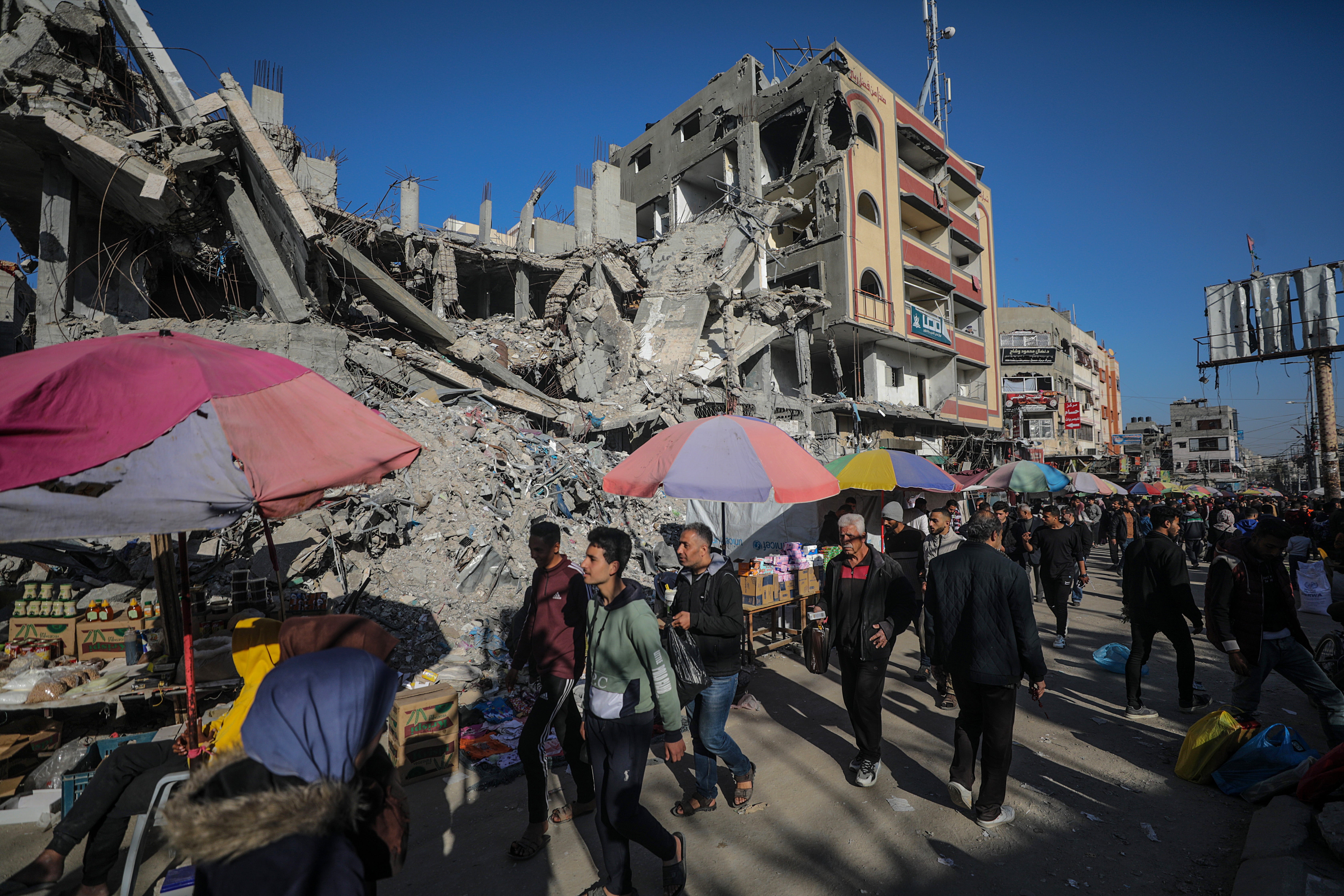‘We’re not getting off the gas’: Netanyahu rejects Biden’s plea to de-escalate in Gaza
White House presses Israel to adhere to ‘laws of war’ after US president calls Rafah assault a ‘red line’
Your support helps us to tell the story
From reproductive rights to climate change to Big Tech, The Independent is on the ground when the story is developing. Whether it's investigating the financials of Elon Musk's pro-Trump PAC or producing our latest documentary, 'The A Word', which shines a light on the American women fighting for reproductive rights, we know how important it is to parse out the facts from the messaging.
At such a critical moment in US history, we need reporters on the ground. Your donation allows us to keep sending journalists to speak to both sides of the story.
The Independent is trusted by Americans across the entire political spectrum. And unlike many other quality news outlets, we choose not to lock Americans out of our reporting and analysis with paywalls. We believe quality journalism should be available to everyone, paid for by those who can afford it.
Your support makes all the difference.Benjamin Netanyahu said Israel’s military is “not getting off the gas” with its assault in southern Gaza where hundreds of thousands of Palestinians are sheltering, despite President Joe Biden’s warning that an attack on Rafah is a “red line” in its war on Hamas.
“Ultimately, it’s Israel that has to decide,” Israel’s prime minister told Fox & Friends on Fox News on Monday.
“I’m telling you that we’re not getting off the gas,” he added. “I’m telling you that we have to take care of Israel’s security and our future and that requires eliminating the terrorist army. That’s a prerequisite for victory.”
Mr Netanyahu’s remarks, on the first day of the holy month of Ramadan, follow more public criticism from President Biden within the last week, including the president’s message to Israel for “humanitarian assistance” during his State of the Union address and recent remarks that his ally is “hurting Israel more than helping” by disregarding “innocent lives being lost” in Gaza.
After months of international demands for US support for a ceasefire, the Biden administration has now supported a six-week pause in fighting to allow for the flow of aid. The president has also proposed an “emergency” seaport to expedite aid delivery that could take up to two months to construct.
US military planes have air-dropped more than 27,000 meals and more than 25,000 bottles of water into northern Gaza in recent days, according to US Central Command.

Israel’s government has not presented its most powerful ally – supplying tens of billions of dollars in military support – with any plan for allowing humanitarian assistance or for an attack of Rafah, according to US State Department spokesperson Matthew Miller.
Mr Miller told reporters on Monday that the US has “made clear both in the private conversations” and publicly “that it is our judgment that they cannot or should not go into Rafah without a humanitarian assistance plan that is credible.”
In an interview with MSNBC on Saturday, President Biden said an operation in Rafah constitutes a “red line” but insisted that the US will continue to support Israel. Neither the administration nor Congress has placed any apparent conditions on its ongoing military support for Israel despite pressure from progressive lawmakers and global aid groups.
Asked what a “red line” means for the president, White House deputy press secretary Olivia Dalton said it would not be “productive to assign a ‘red line’ sort of terminology to what is a very complex set of policies.”
The last time the two leaders last spoke was in mid-February, Ms Dalton told reporters on Monday.
She told reporters on Monday that their relationship remains “clear and consistent” and allows them to be “direct and honest when needed.”
Israel’s “right to protect itself” needs to be “in a manner that is consistent with the laws of war” and must “pay greater attention to the level of humanitarian suffering and the unacceptably higher number of civilian casualties that we’re seeing,” she said.
“No military operation should take place in Rafah, if there is not a credible and implementable plan to take care of the safety and security needs of the more than 1 million civilians who are sheltering there, and we’ve seen no such plan,” she added.
More than 30,000 Palestinians, including 14,000 children, have been killed in Gaza since the launch of Israel’s retaliatory campaign in the wake of Hamas attacks that killed 1,200 on October 7.On Monday, the head of the United Nations once again called for a ceasefire in Gaza and to allow for aid to flow into the strip.
“In the spirit of Ramadan, I appeal to all those involved in conflict everywhere to silence the guns and return to the peace table,” UN Secretary-General Antonio Guterres said on Monday.
“I call on political, religious and community leaders everywhere to do everything in their power to make this holy period a time for empathy, action and peace,” he said.
Join our commenting forum
Join thought-provoking conversations, follow other Independent readers and see their replies
Comments